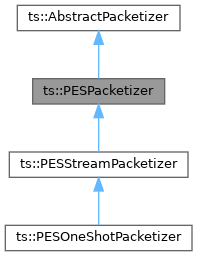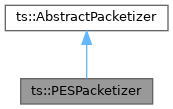Packetization of PES data into Transport Stream packets.
More...
#include <tsPESPacketizer.h>
Packetization of PES data into Transport Stream packets.
PES packets are provided by an object implementing PESProviderInterface. This means that this class works in "pull" mode; it pulls new PES packets from the application when needed. If you need a PES packetizer working in "push" mode, check class PESStreamPacketizer.
◆ PESPacketizer()
Constructor.
- Parameters
-
| [in] | duck | TSDuck execution context. The reference is kept inside the packetizer. |
| [in] | pid | PID for generated TS packets. |
| [in] | provider | An object which will be called each time a PES packet is required. |
◆ setPESProvider()
Set the object which provides PES packets when the packetizer needs more data.
- Parameters
-
| [in] | provider | An object which will be called each time a PES packet is required. |
◆ pesProvider()
Get the object which provides PES packets when the packetizer needs more data.
- Returns
- The object which will be called each time a PES packet is required.
◆ atPESBoundary()
| bool ts::PESPacketizer::atPESBoundary |
( |
| ) |
const |
|
inline |
Check if the TS packet stream is exactly at a PES packet boundary.
- Returns
- True if the last returned TS packet contained the end of a PES packet.
◆ pesCount()
Get the number of completely packetized PES packets so far.
- Returns
- The number of completely packetized PES packets so far.
◆ reset()
| virtual void ts::PESPacketizer::reset |
( |
| ) |
|
|
overridevirtual |
◆ getNextPacket()
| virtual bool ts::PESPacketizer::getNextPacket |
( |
TSPacket & |
packet | ) |
|
|
overridevirtual |
Build the next MPEG packet for the list of items (sections or PES) to pacjetize.
If there is nothing to packetize, generate a null packet on PID_NULL.
- Parameters
-
| [out] | packet | The next TS packet. |
- Returns
- True if a real packet is returned, false if a null packet was returned.
Implements ts::AbstractPacketizer.
◆ display()
| virtual std::ostream & ts::PESPacketizer::display |
( |
std::ostream & |
strm | ) |
const |
|
overridevirtual |
◆ setPID()
| void ts::AbstractPacketizer::setPID |
( |
PID |
pid | ) |
|
|
inlineinherited |
Set the default PID for subsequent MPEG packets.
- Parameters
-
| [in] | pid | PID for generated TS packets. |
◆ getPID()
| PID ts::AbstractPacketizer::getPID |
( |
| ) |
const |
|
inlineinherited |
Get the default PID for subsequent MPEG packets.
- Returns
- PID for generated TS packets.
◆ setNextContinuityCounter()
| void ts::AbstractPacketizer::setNextContinuityCounter |
( |
uint8_t |
cc | ) |
|
|
inlineinherited |
Set the continuity counter value for next MPEG packet.
This counter is automatically incremented at each packet. It is usually never a good idea to change this, except maybe before generating the first packet if the continuity must be preserved with the previous content of the PID.
- Parameters
-
| [in] | cc | Next continuity counter. |
◆ nextContinuityCounter()
| uint8_t ts::AbstractPacketizer::nextContinuityCounter |
( |
| ) |
const |
|
inlineinherited |
Get the continuity counter value for next MPEG packet.
- Returns
- Next continuity counter.
◆ packetCount()
Get the number of generated TS packets so far.
- Returns
- The number of generated TS packets so far.
◆ report()
| Report & ts::AbstractPacketizer::report |
( |
| ) |
const |
|
inlineinherited |
Get a reference to the debugging report.
- Returns
- A reference to the debugging report.
◆ duck()
| const DuckContext & ts::AbstractPacketizer::duck |
( |
| ) |
const |
|
inlineinherited |
Get a reference to the TSDuck execution context.
- Returns
- A reference to the TSDuck execution context.
◆ configurePacket()
| void ts::AbstractPacketizer::configurePacket |
( |
TSPacket & |
pkt, |
|
|
bool |
nullify |
|
) |
| |
|
protectedinherited |
Configure a TS packet with continuity and PID.
Also increment the number of generated packet. So this method must be called exactly once per packet.
- Parameters
-
| [in,out] | pkt | TS packet to configure |
| [in] | nullify | Return a null packet instead (no data to return for now). |
The documentation for this class was generated from the following file:



